
- Belongs to the Research Programs Unit of the Medical Faculty
- Elected for the years 2013-2018
- Composes of the laboratories of 10 distinguished Principal Investigators


Alitalo Group
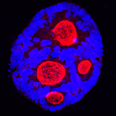 The group of Dr. Kari Alitalo focuses on tumor targeting via inhibition of tumor vasculature and lymphatic metastasis development. The group has discovered that the homeobox transcription factor PROX1 marks the transition from benign colon adenoma to carcinoma in situ, and its loss inhibits growth of human colorectal tumor xenografts and intestinal adenomas in mice, while its transgenic overexpression promotes colorectal tumorigenesis. They study 3D colon carcinoma culture models, intestinal/cancer stem cells and Prox1 regulated genes in cultured cells, in mouse tumor models and human patients.
The group of Dr. Kari Alitalo focuses on tumor targeting via inhibition of tumor vasculature and lymphatic metastasis development. The group has discovered that the homeobox transcription factor PROX1 marks the transition from benign colon adenoma to carcinoma in situ, and its loss inhibits growth of human colorectal tumor xenografts and intestinal adenomas in mice, while its transgenic overexpression promotes colorectal tumorigenesis. They study 3D colon carcinoma culture models, intestinal/cancer stem cells and Prox1 regulated genes in cultured cells, in mouse tumor models and human patients.
Haglund Group
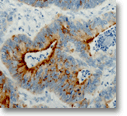 The group of Dr. Caj Haglund focuses on colorectal cancer (CRC), which is the third most common cancer worldwide. The aim of the group is to improve the use of tissue and circulating biomarkers for diagnosis, follow-up and prognostic and predictive evaluation of CRC. They aim to study cell surface glycan changes and changes in genetic expression (i.e. mRNA transcripts) of potential marker antigens. Antibodies or peptides against the hit molecules will then be used for immunohistochemical studies. Another new technology is an extremely sensitive repeatable RT-PCR-method for measuring the relative amounts on mRNA transcripts in small tumor samples, also in formalin-fixed specimens.
The group of Dr. Caj Haglund focuses on colorectal cancer (CRC), which is the third most common cancer worldwide. The aim of the group is to improve the use of tissue and circulating biomarkers for diagnosis, follow-up and prognostic and predictive evaluation of CRC. They aim to study cell surface glycan changes and changes in genetic expression (i.e. mRNA transcripts) of potential marker antigens. Antibodies or peptides against the hit molecules will then be used for immunohistochemical studies. Another new technology is an extremely sensitive repeatable RT-PCR-method for measuring the relative amounts on mRNA transcripts in small tumor samples, also in formalin-fixed specimens.
Keywords: colorectal cancer, biomarker, cancer glycome screening
Holmberg-Still Group
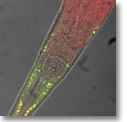 The group of Dr. Carina Holmberg-Still focuses on the regulation of proteasome activity and on how dysregulation of proteasomal protein degradation contributes to aging-related diseases such as various types of cancers. By taking advantage of the genetically tractable C. elegans system, they have successfully established the first animal model for real-time measurements of ubiquitin-proteasome system activity based on a novel photoconvertible fluorescent reporter system and shown that protein degradation varies in a cell type-specific and age-dependent manner in a living animal. Their studies should provide potential targets for therapeutic interventions as well as molecular knowledge required for improving the cellular targeting of cancer treatment related to proteasome dysfunction.
The group of Dr. Carina Holmberg-Still focuses on the regulation of proteasome activity and on how dysregulation of proteasomal protein degradation contributes to aging-related diseases such as various types of cancers. By taking advantage of the genetically tractable C. elegans system, they have successfully established the first animal model for real-time measurements of ubiquitin-proteasome system activity based on a novel photoconvertible fluorescent reporter system and shown that protein degradation varies in a cell type-specific and age-dependent manner in a living animal. Their studies should provide potential targets for therapeutic interventions as well as molecular knowledge required for improving the cellular targeting of cancer treatment related to proteasome dysfunction.
Keywords: proteasome regulators, aging, signaling pathways, C. elegans
Jeltsch Group
Jeltsch Group
Joensuu Group
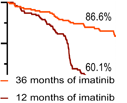 The clinical studies in Dr. Heikki Joensuu’s group focus mainly on breast cancer and gastrointestinal stromal tumor (GIST), but they also address aspects of gliomas and head and neck cancer. They currently investigate 1) efficacy and safety of a short course of administration of trastuzumab, a monoclonal antibody against the HER2-kinase, in combination with chemotherapy as adjuvant treatment of HER2-positive breast cancer; 2) imatinib as adjuvant treatment of GIST after surgery; and 3) the mechanisms of action of these adjuvant therapies, predictive factors related to treatments, and biological disease markers in translational research projects that are based on tissue samples collected within the context of clinical trials. The analysis includes multiplex ELISAs and exome mutation analyses using second-generation sequencing.
The clinical studies in Dr. Heikki Joensuu’s group focus mainly on breast cancer and gastrointestinal stromal tumor (GIST), but they also address aspects of gliomas and head and neck cancer. They currently investigate 1) efficacy and safety of a short course of administration of trastuzumab, a monoclonal antibody against the HER2-kinase, in combination with chemotherapy as adjuvant treatment of HER2-positive breast cancer; 2) imatinib as adjuvant treatment of GIST after surgery; and 3) the mechanisms of action of these adjuvant therapies, predictive factors related to treatments, and biological disease markers in translational research projects that are based on tissue samples collected within the context of clinical trials. The analysis includes multiplex ELISAs and exome mutation analyses using second-generation sequencing.
Keywords: breast cancer, gastrointestinal stromal tumor (GIST), clinical trial, adjuvant therapy
Keski-Oja Group
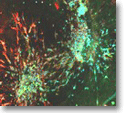 Recent results of Dr. Jorma Keski-Oja's group indicate that netrins, extracellular guidance cues of cells, are associated with malignant growth and invasion of tumor cells. The group has identified numerous proteins that form receptor complexes mediating the effects of netrin in glioma cells as a model. The group is analyzing and mapping these interactions at the molecular level and characterizing the functions of these complexes. The group explores also other cancer related extracellular cues such as LTBPs in order to obtain new insights into cancer related cell signaling.
Recent results of Dr. Jorma Keski-Oja's group indicate that netrins, extracellular guidance cues of cells, are associated with malignant growth and invasion of tumor cells. The group has identified numerous proteins that form receptor complexes mediating the effects of netrin in glioma cells as a model. The group is analyzing and mapping these interactions at the molecular level and characterizing the functions of these complexes. The group explores also other cancer related extracellular cues such as LTBPs in order to obtain new insights into cancer related cell signaling.
Keywords: TGF-beta, growth factors, LTBP, netrins, cell invasion
Klefström Group
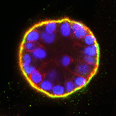 Dr. Juha Klefström group is interested in the role of cell polarity pathways in cancer development and in metabolic regulation of tumor cells. The group focuses on the mechanisms of breast cancer progression, the tumor suppressor gene LKB1, AMPK and therapeutically interesting proteolytic pathways specifically activated in cancer cells with polarity defects.The studies involve 3D culture, transgenic and tissue mosaic models of breast cancer combined with functional genetic, molecular modeling and chemical biology approaches. The group has actively participated in collaborative preclinical target validation and discovery programs.
Dr. Juha Klefström group is interested in the role of cell polarity pathways in cancer development and in metabolic regulation of tumor cells. The group focuses on the mechanisms of breast cancer progression, the tumor suppressor gene LKB1, AMPK and therapeutically interesting proteolytic pathways specifically activated in cancer cells with polarity defects.The studies involve 3D culture, transgenic and tissue mosaic models of breast cancer combined with functional genetic, molecular modeling and chemical biology approaches. The group has actively participated in collaborative preclinical target validation and discovery programs.
Keywords: Myc, apoptosis, epithelial integrity, cell signalling
Koli Group
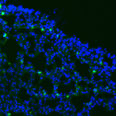 Fibrotic processes may create a tumor promoting microenvironment. Fibroblasts that accumulate in idiopathic pulmonary fibrosis (IPF) lungs share many features of cancer associated fibroblasts. Secreted growth factors regulate epithelial-mesenchymal crosstalk in the lung. Dr. Katri Koli's group investigates the functional role of TGF-?/BMP family growth factors in the pathogenesis of malignant and fibrotic lung diseases. The group is also interested in extracellular regulation of these growth factors by secreted inhibitor proteins and targeting into fibrillar matrix structures. Keywords: TGF-β/BMP, gremlin, extracellular matrix, mesothelioma, IPF
Fibrotic processes may create a tumor promoting microenvironment. Fibroblasts that accumulate in idiopathic pulmonary fibrosis (IPF) lungs share many features of cancer associated fibroblasts. Secreted growth factors regulate epithelial-mesenchymal crosstalk in the lung. Dr. Katri Koli's group investigates the functional role of TGF-?/BMP family growth factors in the pathogenesis of malignant and fibrotic lung diseases. The group is also interested in extracellular regulation of these growth factors by secreted inhibitor proteins and targeting into fibrillar matrix structures. Keywords: TGF-β/BMP, gremlin, extracellular matrix, mesothelioma, IPF
Laakkonen Group
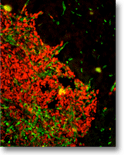
Research in Dr. Pirjo Laakkonen´s group focuses on cancer invasion and metastasis. We are especially interested in the mechanisms and molecular pathways underlying invasion of malignant glioma as well as metastasis of melanoma and breast cancer. Glioblastoma multiforme (GBM) is the most aggressive and the most common primary brain tumor in adults. Owing to their infiltrative growth, gliomas are associated with high morbidity and mortality. Both breast cancer and melanoma form metastatic lesions in various organs including the brain. We have recently identified novel metastasis/invasion associated proteins by using comparative proteomics and in vivo phage display technology. Currently, our research focuses on studying the cellular mechanisms affected by these proteins that promote cancer invasion. In addition, we have identified a novel peptide that very specifically homes to malignant gliomas and their vasculature. We have succesfully used the peptide for glioma imaging, delivery of targeted chemotherapeutics and nanoparticles. We are developing innovative novel targeted therapies against malignant gliomas based on our peptide.
Keywords:, preclinical models, phage display, metastasis, peptide, proteomics, tumor targeting
Ojala Group
Saharinen Group: Growth factor signaling in cancer
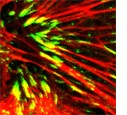 Anti-angiogenic strategies that inhibit tumor blood vessel growth are widely used to treat human cancer. All current drugs target the vascular endothelial growth factor (VEGF) pathway. However, the clinical benefits are often limited, and the available drugs may not be suitable for all patients. Therefore, additional anti-angiogenic strategies are needed. The focus of Saharinen group is to understand endothelial growth factor receptor signaling pathways in order to identify novel targets and biomarkers of anti-angiogenic therapy. A special focus is on the Angiopoietin growth factors and the Tie receptor tyrosine kinases that regulate vascular development, normal homeostasis and tumor angiogenesis. The group has identified molecular mechanisms of the Angiopoietin-Tie pathway that regulate tumor metastasis. Central to the work are endothelial cell biological and in vivo models that allow the analysis of gene specific functions in the endothelium.
Anti-angiogenic strategies that inhibit tumor blood vessel growth are widely used to treat human cancer. All current drugs target the vascular endothelial growth factor (VEGF) pathway. However, the clinical benefits are often limited, and the available drugs may not be suitable for all patients. Therefore, additional anti-angiogenic strategies are needed. The focus of Saharinen group is to understand endothelial growth factor receptor signaling pathways in order to identify novel targets and biomarkers of anti-angiogenic therapy. A special focus is on the Angiopoietin growth factors and the Tie receptor tyrosine kinases that regulate vascular development, normal homeostasis and tumor angiogenesis. The group has identified molecular mechanisms of the Angiopoietin-Tie pathway that regulate tumor metastasis. Central to the work are endothelial cell biological and in vivo models that allow the analysis of gene specific functions in the endothelium.
